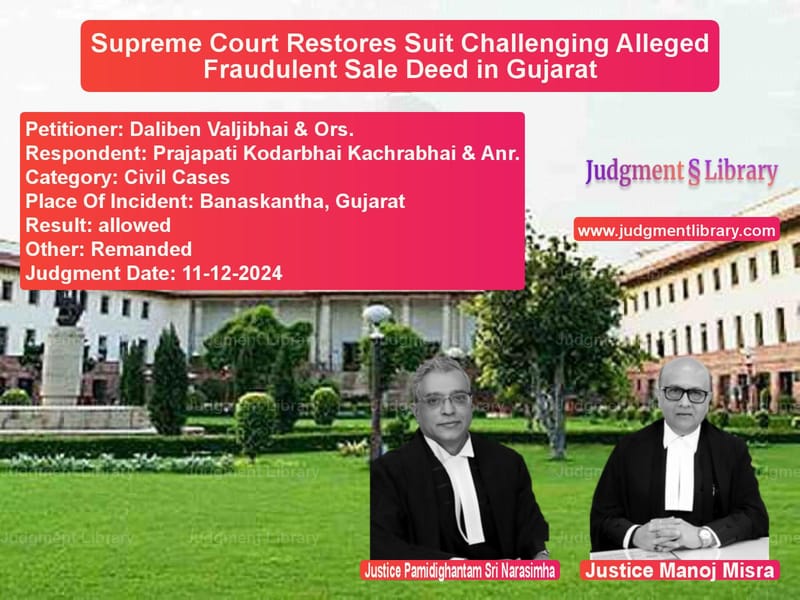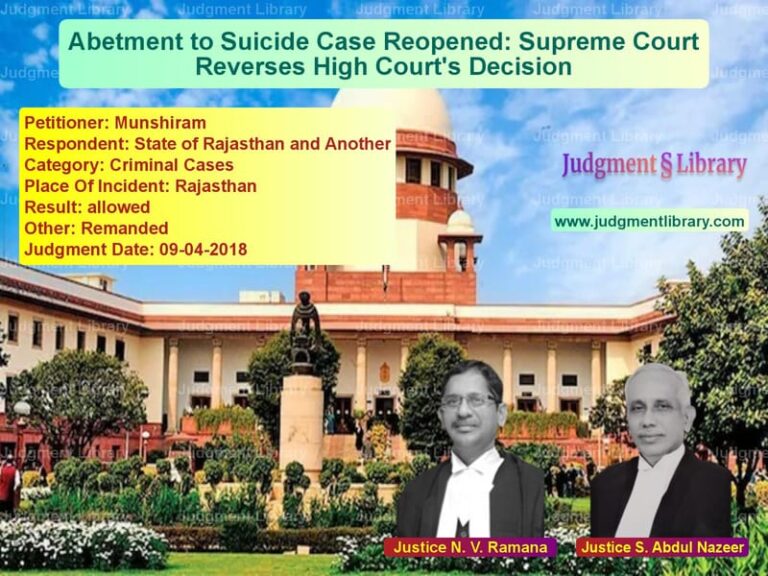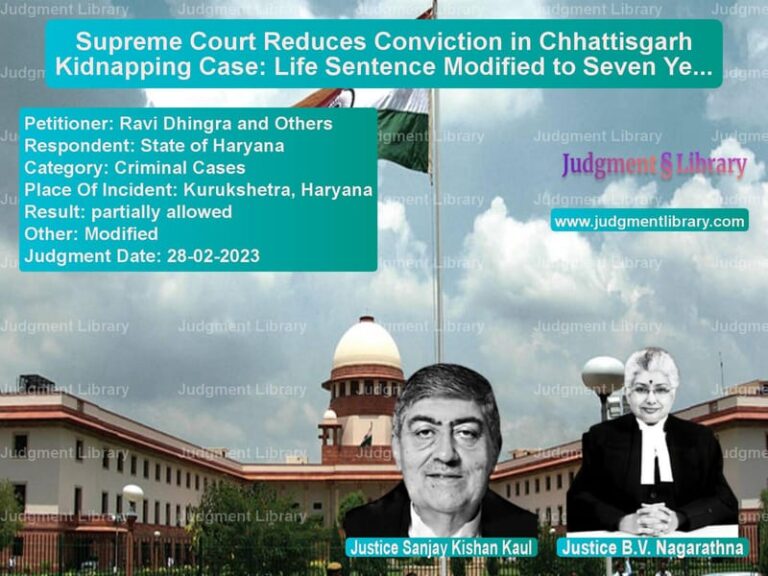Supreme Court Restores Suit Challenging Alleged Fraudulent Sale Deed in Gujarat
The Supreme Court of India, in the case of Daliben Valjibhai & Ors. vs. Prajapati Kodarbhai Kachrabhai & Anr., ruled in favor of the appellants by setting aside the Gujarat High Court’s judgment, which had rejected their suit challenging a registered sale deed. The judgment, delivered by Justices Pamidighantam Sri Narasimha and Manoj Misra, reinstated the case for trial, emphasizing that issues of fraud and limitation must be decided on the basis of evidence rather than dismissed at the preliminary stage.
Background of the Case
The appellants, as plaintiffs, filed a suit on April 10, 2017, seeking cancellation of a registered sale deed dated December 4, 2004, alleging that it was executed fraudulently without their knowledge. They claimed they became aware of the sale only on March 31, 2017, when the Deputy Collector issued a notice regarding correction of revenue records.
The defendants, now respondents, filed an application under Order 7 Rule 11 of the Code of Civil Procedure (CPC), arguing that the suit was barred by limitation as it was filed 13 years after the execution of the sale deed.
Decisions of the Lower Courts
Trial Court’s Decision
The Trial Court dismissed the suit on April 26, 2018, holding that:
- The sale deed was executed in 2004, and the plaintiffs waited 13 years before challenging it.
- Under Article 59 of the Limitation Act, 1963, a suit for cancellation of an instrument must be filed within three years from when the plaintiff first had knowledge of it.
- The plaintiffs’ claim of discovering the sale deed only in 2017 was untenable.
First Appellate Court’s Decision
The plaintiffs appealed, and the Principal Judge, Banaskantha at Palanpur, overturned the Trial Court’s decision on October 17, 2023, holding that:
- The plaintiffs had no prior knowledge of the sale deed and came to know of it only when the Deputy Collector issued notice.
- The sale deed bore forged signatures and thumb impressions, and the plaintiffs were never present at the time of its execution.
- The revenue records did not reflect any changes from 2004 until 2017, supporting the plaintiffs’ claim.
- Limitation should be determined during the trial based on evidence.
High Court’s Decision
The defendants filed a Second Appeal before the Gujarat High Court, which on June 26, 2024, reversed the Appellate Court’s decision and upheld the Trial Court’s ruling. The High Court held that:
- Under Section 3 of the Transfer of Property Act, 1882, knowledge of a registered document is presumed from the date of registration.
- The burden of proof was on the plaintiffs to show they were unaware of the sale deed.
- Mere allegations of fraud without detailed particulars were insufficient.
- Since the document was publicly registered, limitation began from 2004, making the suit time-barred.
Supreme Court’s Observations
On the Application of Order 7 Rule 11
The Court emphasized that rejection of a plaint under Order 7 Rule 11 is a drastic measure:
“The power to reject a plaint must be exercised cautiously. Limitation is a mixed question of law and fact, and unless the averments in the plaint itself clearly show that the suit is barred, the matter must proceed to trial.”
On the Presumption of Knowledge
The Court disagreed with the High Court’s view that knowledge must be presumed from the date of registration:
“The plaintiffs have pleaded that they were unaware of the sale deed until 2017. This is a factual issue that requires trial. The High Court erred in presuming knowledge solely from the date of registration.”
On the Fraud Allegations
The Court referred to its precedents in P.V. Guru Raj Reddy v. P. Neeradha Reddy (2015) and Chhotanben v. Kirtibhai Jalkrushnabhai Thakkar (2018), holding that fraud vitiates all transactions:
“When fraud is alleged, courts must allow the matter to be adjudicated on evidence. Fraud is an exception to limitation, and the issue must be tested during trial, not summarily dismissed.”
Final Verdict
The Supreme Court allowed the appeal and issued the following directives:
- The judgment of the Gujarat High Court dated June 26, 2024, is set aside.
- The judgment of the First Appellate Court dated October 17, 2023, is restored.
- The suit shall proceed to trial, and the Trial Court is directed to dispose of it expeditiously.
Impact of the Judgment
This ruling has significant implications:
- Affirms that limitation in fraud cases must be determined at trial.
- Restricts the use of Order 7 Rule 11 for rejecting suits at the preliminary stage.
- Clarifies that knowledge of a registered document cannot be presumed in all cases.
- Strengthens property rights by allowing genuine fraud claims to be heard.
The judgment underscores that courts must ensure fair hearings and prevent premature dismissals in cases involving fraud allegations.
Petitioner Name: Daliben Valjibhai & Ors..Respondent Name: Prajapati Kodarbhai Kachrabhai & Anr..Judgment By: Justice Pamidighantam Sri Narasimha, Justice Manoj Misra.Place Of Incident: Banaskantha, Gujarat.Judgment Date: 11-12-2024.
Don’t miss out on the full details! Download the complete judgment in PDF format below and gain valuable insights instantly!
Download Judgment: daliben-valjibhai-&-vs-prajapati-kodarbhai-supreme-court-of-india-judgment-dated-11-12-2024.pdf
Directly Download Judgment: Directly download this Judgment
See all petitions in Property Disputes
See all petitions in Contract Disputes
See all petitions in Succession and Wills
See all petitions in Damages and Compensation
See all petitions in Judgment by P.S. Narasimha
See all petitions in Judgment by Manoj Misra
See all petitions in allowed
See all petitions in Remanded
See all petitions in supreme court of India judgments December 2024
See all petitions in 2024 judgments
See all posts in Civil Cases Category
See all allowed petitions in Civil Cases Category
See all Dismissed petitions in Civil Cases Category
See all partially allowed petitions in Civil Cases Category







